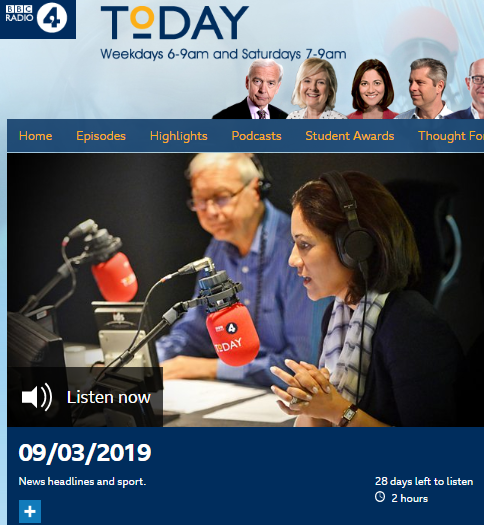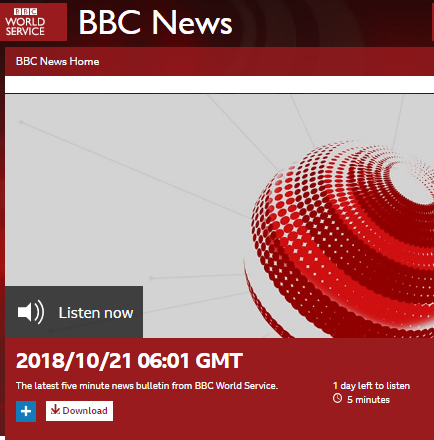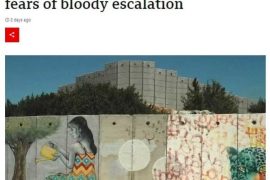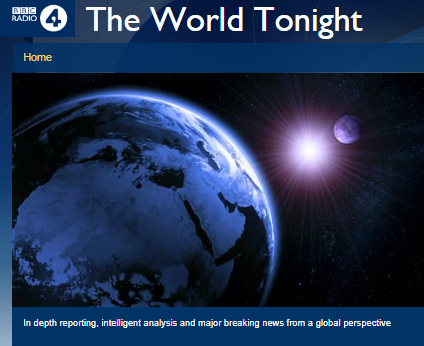The March 9th edition of the BBC Radio 4 ‘Today’ programme included an item by Mishal Husain who is currently in Lebanon for a special broadcast from that country on March 11th to mark eight years since the beginning of the uprising in Syria.
Although the report (from 35:20 here) was introduced by both co-presenter Martha Kearney and Mishal Husain as being connected to the topic of “the war in Syria” and UK aid to Syrians displaced by that conflict, its focus soon shifted to a different topic.
[emphasis in italics in the original, emphasis in bold added]
Husain: “The UK’s just pledged an extra £100 million for Syrians in need and the Foreign Office minister Alistair Burt has told me host countries like Lebanon need ongoing support too. He came to Beirut straight after the government’s decision to ban the political wing of Hizballah – an organisation that’s had elected MPs in the Lebanese parliament for years. It’s part of the current government, controlling three ministries. I’ve been speaking to Amal Saad, professor of political science at the Lebanese University and the author of a book on Hizballah.”
As we see, that introduction (notable for Husain’s promotion of the entirely false notion of separate ‘wings’ of Hizballah) was no more helpful in aiding listeners to understand that they were about to hear from a Hizballah supporter than were the introductions heard by audiences on previous occasions when the BBC brought in Amal Saad for comment.
Listeners also received no information which would help them understand that when Hizballah and its supporters speak of ‘resistance’ against Israel, they in fact mean the destruction of that state.
Saad: “It’s first and foremost priority is resisting Israel and now fighting jihadis.”
Husain: “How entrenched is it in Lebanese politics, in Lebanese society today?”
Saad: “For the past 15 years or so Hizballah has been deeply entrenched in the Lebanese state: in the civil service, also in municipalities – across the board basically. And of course there is also the military and security cooperation that Hizballah has with the Lebanese army and with Lebanon’s security services.”
Listeners heard no mention of the fact that the 2006 UN Security Council resolution 1701 stated that there should be “no authority other than that of the Government of Lebanon” and that previous accords pertaining to “the disarmament of all armed groups in Lebanon, so that, pursuant to the Lebanese cabinet decision of 27 July 2006, there will be no weapons or authority in Lebanon other than that of the Lebanese State” should be implemented. Predictably, neither Husain nor her interviewee bothered to inform listeners that Hizballah is funded and supplied with weapons (also in violation of that UN resolution) by a foreign power.
Husain went on to once again promote the chimera of different ‘wings’ of the terror group.
Husain: “The UK says it can no longer make a distinction between the military and the political wing of Hizballah. Is it a false distinction to make?”
Saad: “I think it was an artificial one and it was a politically expedient one to facilitate dialogue and cooperation with Hizballah in Lebanon. In fact Hizballah is not a party with a military wing. It’s a resistance army and it has a political wing.”
Husain: “And that has meant fighting on the same side as President Assad in Syria and it’s been linked to the Houthi fighters backed by Iran in Yemen. One assumes that that is what the UK means when it says it’s destabilising the Middle East.”
The BBC’s domestic audiences then heard the claim that their own government’s policies are dictated by foreign interests.
Saad: “The British focused a lot on its role in Syria in the parliamentary report. The main argument was about Hizballah’s destabilising role in the region with emphasis on Syria. There was very little about actual terrorist incidents anywhere in the world. The UK is very troubled by Hizballah’s role in the region in the sense that it conflicts with US interests in the region. I think that’s the real problem.”
Despite having been told that Hizballah is a militia, Husain persisted in labelling it as a political organisation:
Husain: “But it is a party which has a history in what you call the resistance to Israel. It’s been responsible in the past for bombings, there were tunnels that have been dug into Israel. You look at all of that and around and then perhaps people say well, this is a valid decision for the UK to have taken.”
Saad: “This is part and parcel of an open war between Hizballah and Israel. There’s a balance of deterrence between the two. Even if we were talking about any transgressions that the UK has decided Hizballah has made, you know, they could try Hizballah for war crimes if they like. But that’s not the same thing as terrorism.”
That part of the item closed with that whitewashing of Hizballah’s terror activities and with no mention of UNSC resolution 1701 or Iran’s role as Hizballah’s mentor and supplier and no explanation of what the euphemism ‘resistance’ really means.
Despite having been told by Amal Saad in very plain terms that the notion of separate wings of Hizballah is “artificial”, Husain then went on to press her point (from 38:35) with Alistair Burt.
Husain: “We did make that distinction for more than a decade. So what has changed?”
Husain: “Last year a minister said that there wasn’t the evidence to proscribe the political wing of Hizballah. What changed between last year and this year?”
And when Burt mentioned the annual ‘Quds Day’ marches in the UK, Husain interrupted him with the following flippant remark:
Husain: “You made this decision on the basis of flags at a demonstration?”
Clearly this item, with comment coming from a Hizballah supporter and numerous grave omissions, comes nowhere near to providing licence fee paying listeners with the “accurate and impartial news, current affairs and factual programming of the highest editorial standards” that is supposed to improve their ability to understand their own government’s decision to proscribe Hizballah.
Related Articles:
BBC WS radio listeners get unchallenged Hizballah messaging – part one
BBC WS radio listeners get unchallenged Hizballah messaging – part two
BBC’s Newshour Extra listeners get a partisan ‘explanation’ of Hizballah
Usual mantras in BBC News report on Hizballah designation




